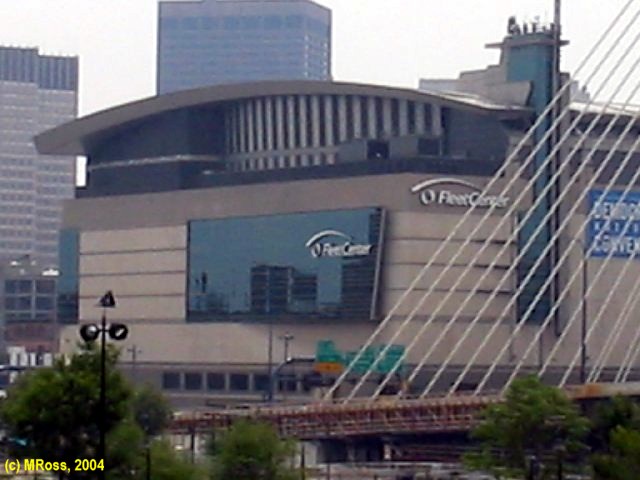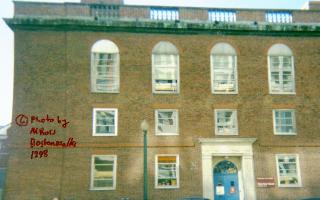 undefined
undefined
 ...How many?
...How many?


BostonWalks |
Celebrating |
|

Now available!The Jewish Friendship Trail Guidebook6
Self-Guided Walking/Bicycling Jewish Boston History Tours Covers
Boston, Brookline, and Cambridge Softcover 198 pages with maps &
b/w photos Print out this |
Now available!
The Ten Commandments Guidebook Ways to Self-Struggle with
Classic Morals In Song, Poetry, and Prose
Covers 10 Commandments Plus One Other! Softcover 153 pages with
practical suggestions pages! Print out this |
West End House

Email: BostonWalks
Telephone: 617-489-5020

Hecht House, West End House, and Civic Service Center were three educational and recreational clubs - the first two serving youth and the third adults.
Hecht House specifically served Jewish girls and boys. West End House (formerly the Excelsior Club), started as an all-Jewish boys club and principally served a Jewish membership up to WWII (Officially, it was non-sectarian from 1906 forward.). Civic Service Center, located on Salem Street next to Baldwin Place in the center of Boston's North End Jewish population, in its first two decades attracted a majority of Jewish adults (as well as Italian and Irish immigrants).
Today, two downtown Boston buildings survive of this trio of clubs: the 1929 edifice of West End House at 16 Blossom Street and the building at 112 Salem Street which housed the Civic Service Center. No plaques describe their roles in socializing the children and adults of our Jewish immigrants.
Instrumental to the early development of these three clubs were
By analogy, Lina Hecht, James Storrow, and Pauline Agassiz Shaw were the producers (funding and inspiration); Golde Bamber, Mitchell Freiman, and Meyer Bloomfield/Philip Davis were the directors (implementation).
As the Jewish immigrant population migrated to the West End, so did Lina's and Golde's clubs. With Hecht's financial resources, there in the West End, the clubs were reconstituted as the Hecht Neighborhood Houses, rented several locations, and invited the participation of both girls and boys. Even after Lina Hecht's death in 1920, Hecht Houses continued their social services well beyond the middle of this century, following the Jewish population into Dorchester.
West End House
The Excelsior Club's activities included performances of scenes from Shakespearian plays. James Storrow, prominent Boston Brahmin banker and politician, attended one performance of scenes from their Hamlet. Afterwards, he invited the entire membership of the Club to spend a winter Sunday in the country at his Lincoln estate.
In the Spring, upon learning of the boys' lack of facilities and financial resources; he agreed to not only pay for building rent and maintenance but also to hire Mitchell Freiman fulltime as director for the now re-constituted Excelsior Club to be known as the West End House. While technically non-sectarian, the West End House membership would remain predominantly Jewish up to World War II.
From athletics to declamation, from minstrel shows to a West End House symphony orchestra, from the House Bulletin to a speakers series; West End House was a powerful force in many Jewish boys lives.
Alexander Brin, the second Editor/Publisher of The Jewish Advocate, was one of the many speakers at West End House evenings. His topic: "Jewish Ideals and Abraham Lincoln."

Civic Service Center
At the turn of the century, two freshly-minted Jewish social workers, Meyer Bloomfield and Philip Davis, began work here to teach immigrants the English language, American history, and other work and socialization skills. They were funded by Pauline Agassiz Shaw, who had funded a similar project for children a few blocks away at the corner of North Bennett Street.
For a while, Philip Davis, newly-married, lived upstairs in Civic Service Center and experienced first hand the immigrant life in the North End. His book, "And Crown Thy Good," gives eloquent voice to the experiences of the Jewish immigrant. In one anecdote, he describes a mohel (a ritual-circumciser of eight-day-old Jewish boys) who was refused admittance to the United States because he was too old to slaughter animals! Davis tells us how he was able to explain to Immigration officials the distinction between butchers and mohels; and, thereby, salvage this immigrant's admittance.
Philip Davis, an immigrant himself, also was a cousin of Chaim Weizmann, our Zionist leader and first President of Israel. In 1921, when Weizmann passed through Boston, he visited with the Davis family, by then living in Medford, where Davis tells us they shared their stories of common boyhoods in Russia.
Meyer Bloomfield, with degrees in law and social work, beside directing Civic Service Center, also worked with Louis D. Brandeis to settle a variety of labor disputes including garment industry strikes. The preferential union shop was one of the results of their combined resolution efforts. Hecht House, West End House, and Civic Service Center, in serving the Jewish immigrant population well, were significant contributors to today's Boston Jewish community.

![]()
Available 2007
BostonWalks' and The Jewish Friendship Trail Group Walking Tours
|


Now available!The Jewish Friendship Trail Guidebook6
Self-Guided Walking/Bicycling Jewish Boston History Tours Covers
Boston, Brookline, and Cambridge Softcover 198 pages with maps &
b/w photos Print out this |
Now available!
The Ten Commandments Guidebook Ways to Self-Struggle with
Classic Morals In Song, Poetry, and Prose
Covers 10 Commandments Plus One Other! Softcover 153 pages with
practical suggestions pages! Print out this |

Email:
BostonWalks
Telephone:617-489-5020
Chazak Ve-ematz
|
Boston Walks
|
Sing Sense to America
|




Question: What's a political mensch?
Answer #1 |